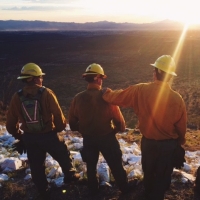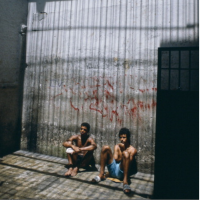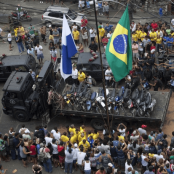Confinement, Cauterization, and Antipolitics in the Americas
 Editorial Introduction, Incarceration and Transformation: Jennifer Curtis and Randi Irwin
Editorial Introduction, Incarceration and Transformation: Jennifer Curtis and Randi Irwin
As states in both North and South America expand authoritarian practices of confinement, citizens balance responding to immediate crises, such as the Trump administration’s family separation policy for immigrants and asylum seekers, and resisting the way confinement practices constrain and confine dissent over time. . .
 Selfhood in Flames? Imprisonment and Cauterization in Arizona’s Prison Wildfire Program: Lindsey Raisa Feldman
Selfhood in Flames? Imprisonment and Cauterization in Arizona’s Prison Wildfire Program: Lindsey Raisa Feldman
The United States, self-mythologized for centuries as a paragon of freedom and liberty, now serves as an ironic exemplar of detention in multiple dehumanizing forms. Although the U.S. has hardened its stance regarding refugee resettlement and immigration in lockstep with other western countries (particularly those in western Europe), it stands alone in its staggering rates of incarceration. . .
 Inside Out: Confinement, Revolt, and Repression in Nicaragua: Julienne Weegels
Inside Out: Confinement, Revolt, and Repression in Nicaragua: Julienne Weegels
Since 18 April 2018, the force deployed by the Sandinista state against a surge of popular protest has left over 400 dead, over 2,000 injured, and hundreds extra-legally detained, beaten, and disappeared.[1] This heavy-handed repression, the appearance of paramilitary, and the rampant numbers of illegal detentions now resulting in convictions for “terrorism,” all point to the long, yet well-hidden. . .
 “Assisted Freedom”: Carceral Transmutation and Juvenile Offenders in Brazil: Sara R. Munhoz
“Assisted Freedom”: Carceral Transmutation and Juvenile Offenders in Brazil: Sara R. Munhoz
In 2012, during my fieldwork in a semi-open socio-educational center on the outskirts of the city of São Paulo, I participated in a meeting with an adolescent offender who had been referred by the Brazilian juvenile court to serve a penalty described as “assisted freedom”. . .
Editorial Introduction II: From Structural to Stochastic Violence: Karina Biondi and Jennifer Curtis
 Last spring, Karina Biondi, 2017 APLA Book Prize winner, approached us to develop a Speaking Justice to Power series on incarceration and confinement in the Americas, their role in authoritarian political movements and government, and how contemporary authoritarianisms in the Americas emerge from shared histories of conquest and captivity. Conceived in the early days of the summer, as the Trump administration was separating immigrant families and detaining children…
Last spring, Karina Biondi, 2017 APLA Book Prize winner, approached us to develop a Speaking Justice to Power series on incarceration and confinement in the Americas, their role in authoritarian political movements and government, and how contemporary authoritarianisms in the Americas emerge from shared histories of conquest and captivity. Conceived in the early days of the summer, as the Trump administration was separating immigrant families and detaining children…
Monitored Confinement and Rule by Philanthropy in Rio de Janeiro and Baltimore: Alessandro Angelini
 A 2009 classified cable from the US Consulate in Rio de Janeiro, later declassified by the whistleblowing platform WikiLeaks, outlined the scope and ambitions of the public security cum development program known as favela “pacification.” A year prior, the state had launched an initiative aimed at reclaiming territories controlled by drug gangs. Pacification represented a strategic overhaul in law enforcement…
A 2009 classified cable from the US Consulate in Rio de Janeiro, later declassified by the whistleblowing platform WikiLeaks, outlined the scope and ambitions of the public security cum development program known as favela “pacification.” A year prior, the state had launched an initiative aimed at reclaiming territories controlled by drug gangs. Pacification represented a strategic overhaul in law enforcement…
Prison and Coup d’État: Jorge Mattar Villela
 About ten years ago I was strolling along Avenida Paulista, Brazil’s most well-known commercial thoroughfare when a person handed me a pamphlet. Without breaking stride, I started to read: “come learn more about this new type of investment.” It was an invitation to an event featuring international experts from countries that had privatized their prisons, from Chile to the United States, discussing the advantages of privatization. This was in 2009. I was alarmed to read about the event…
About ten years ago I was strolling along Avenida Paulista, Brazil’s most well-known commercial thoroughfare when a person handed me a pamphlet. Without breaking stride, I started to read: “come learn more about this new type of investment.” It was an invitation to an event featuring international experts from countries that had privatized their prisons, from Chile to the United States, discussing the advantages of privatization. This was in 2009. I was alarmed to read about the event…
“Donde lo tienen?” Working in an archive of the disappeared in Guatemala: Brie Gettleson 
“But sirs, people do not vanish, ¿Would it be possible that the Earth had swallowed him?, or as the rumors about secret prisons go ¿Is my dear son in some particular place converted into a prison, in one of the Development Zones or military detachment?”…
A Pregnant Kid in a Cage: Jane Doe’s Fight for Reproductive Rights: Nicole M. Guidotti-Hernández
 The Obama administration’s carefully calibrated immigration revisions increased penalties against undocumented border crossers and returned people immediately to their countries of origin. In FY 2016, DHS carried out 530,250 apprehensions and 344,354 removals, compared to 462,388 apprehensions and 333,341 removals a year earlier. Despite the increase, these numbers were far lower than the peak of enforcement operations…
The Obama administration’s carefully calibrated immigration revisions increased penalties against undocumented border crossers and returned people immediately to their countries of origin. In FY 2016, DHS carried out 530,250 apprehensions and 344,354 removals, compared to 462,388 apprehensions and 333,341 removals a year earlier. Despite the increase, these numbers were far lower than the peak of enforcement operations…
